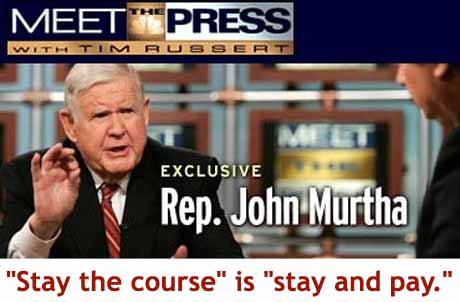 I stood and saluted Rep. John Murtha (D-PA) as he appeared on Meet The Press yesterday. He spoke passionately and made more sense about the Iraq War than most of the patriotic-sounding hogwash that passes as policy at the WH. Crooks and Liars posted a video clip worth a click but I've pulled some of Murtha's relevant quotes from the transcript. Boy, he kicked Bush's butt and the stay the course crowd with tough, truthful, and sensible answers. Somebody in Washington has answers! Can you believe it? Buckle up your seat belts for a lengthy but Topic A post (with emphasis):
I stood and saluted Rep. John Murtha (D-PA) as he appeared on Meet The Press yesterday. He spoke passionately and made more sense about the Iraq War than most of the patriotic-sounding hogwash that passes as policy at the WH. Crooks and Liars posted a video clip worth a click but I've pulled some of Murtha's relevant quotes from the transcript. Boy, he kicked Bush's butt and the stay the course crowd with tough, truthful, and sensible answers. Somebody in Washington has answers! Can you believe it? Buckle up your seat belts for a lengthy but Topic A post (with emphasis):
MR. RUSSERT: The president says, “stay the course,” that within the next six months, Iraq will be secure under the direction of the new prime minister, and to do anything less now would be irresponsible.
REP. MURTHA: Well, “stay the course” is “stay and pay.” This is the thing that has worried me right along. We’re spending $8 billion dollars a month, $300 million dollars a day. And to give you some perspective of what that means... Well, you weigh $30 billion dollars. That’s four months of the cost of this war. This port security, if you want to spend more money, it’d would take 47 years the way we’re spending it. Education, the No Child Left Behind, a couple months of the war would pay for that. Whose going to, whose going to pay for this down the road? Our children and grandchildren are paying for this war. And then you have the, the, the emotional strain, the, the, the people who are being hurt.
On the floor the other day, you may have heard this, one fellow says, “We’re fighting this war.” We’re not fighting this war. One percent of the American people, these young men and women are fighting this war, with heavy packs, with 70 pounds of equipment, with helmets on in 130 degrees. That’s who’s fighting this war. And they say “stay the course.” There’s no plan. You open up this plan for victory, there’s no plan there. It’s just “stay the course.” That doesn’t solve any problem.
It’s worse today than it was six months ago when I spoke out initially. When I spoke out, the garbage wasn’t being collected, oil production below pre-war level—all those things indicated to me we weren’t winning this, and it’s the same today, if not worse. Anbar Province. There’s not one project been done in Anbar Province. Two million people live there. They have no water at all, no oil production, they have no electricity at all in that province where is the heartland of the defense. The first six months we went in there, no—there—not a shot was fired, so it shows you how it’s changed.
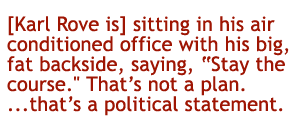
It’s getting worse. That’s why I feel so strongly. All of us know how important it is internationally to win this war. We know how important. We import 20 million barrels of oil a day—we use 20 million barrels of oil. We know how important, international community. But we’re doing it all ourself, and there’s no plan that makes sense. We need to have more international cooperation. We need to redeploy our troops, [to] the periphery. What happened with Zarqawi could have been done from the out—it was done from the outside. Our planes went in from the outside. So there’s no reason in the world that they can’t redeploy the troops. They’ve become the targets, they’re caught in the civil war, and I feel very strongly about it.
[...]
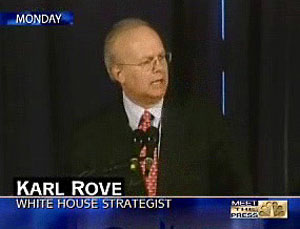
(Videotape, June 12, 2006):
MR. ROVE: Like too many Democrats, it strikes me they are ready to give the green light to go to war, but when it gets tough and when it gets difficult, they fall back on that party’s old pattern of cutting and running. They may be with you at the first shots, but they are not going to be there for the last tough battles. They are wrong, and profoundly wrong, in their approach.
(End of videotape)
MR. RUSSERT: Cutting and running.
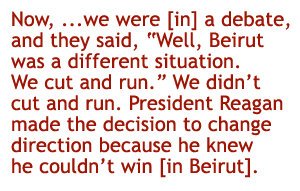
REP. MURTHA: He’s, he’s in New Hampshire. He’s making a political speech. He’s sitting in his air conditioned office with his big, fat backside, saying, “Stay the course.” That’s not a plan. I mean, this guy—I don’t know what his military experience is, but that’s a political statement. This is a policy difference between me and the White House. I disagree completely with what he’s saying.
Now, let’s...give you an example. When we went to Beirut, I, I said to President Reagan, “Get out.” Now, the other day we were doing a debate, and they said, “Well, Beirut was a different situation. We cut and run.” We didn’t cut and run. President Reagan made the decision to change direction because he knew he couldn’t win it. Even in Somalia, President Clinton made the decision, “We have to, we have to change direction. Even with tax cuts. When we had a tax cut under Reagan, we then had a tax increase because he had to change direction. We need to change direction. We can’t win a war like this.
[Karl Rove is] sitting back there criticizing—political criticism, getting paid by the public taxpayer, and he’s saying to us, “We’re, we’re winning this war, and they’re running.” We got to change direction, that’s what we have to do. You can’t, you can’t sit there in the air conditioned office and tell these troops they’re carrying 70 pounds on their back inside these armored vessels and hit with IEDs every day, seeing their friends blown up, their buddies blown up, and he says “stay the course.” Yeah, it’s easy to say that from Washington, D.C.
MR. RUSSERT: Is it appropriate for the president’s principal political adviser to accuse the Democrats of cutting and running?
REP. MURTHA: I think...it’s a, a name—they just use that. I say “stay and pay.” And what I mean by stay and pay, and I’m talking about the hardship on the families, the hardship on the troops. And there’s no plan, that’s the thing. It’s easy to say that. ...the public is way ahead of this. The public is two-to-one against what we’re doing, and they want a change in direction. That’s the thing I see the most.
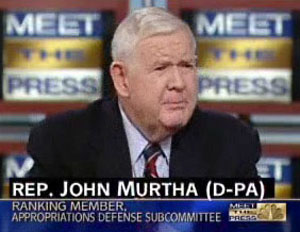
MR. RUSSERT: But in 2004, you had a view that was much different than you had now, and this is what you wrote in your book: “A war initiated on faulty intelligence must not be followed by a premature withdrawal of our troops based on a political timetable. An untimely exit could rapidly devolve into a civil war, which would leave America’s foreign policy in disarray as countries question not only America’s judgment but also its perseverance.” Aren’t you now advocating that?
REP. MURTHA: Yeah, you’re absolutely right. That’s what I said then. And I think in the early stages, you have to judge that. But there comes a time when you got to change direction. There comes a time when you have to say to yourself, “OK, we’ve done everything we could do, we can’t win this militarily.” That’s why—and I talk to the military leaders, I talk to the troops, I go to the hospitals all the time.
So there’s two reasons that I felt it was absolutely essential we change direction. One is the troops themselves and what they’re going through and the fact that 42 percent of them don’t even know what the mission is. And, and the second thing is the long-term stability of this country, our inability to prevent another war because we don’t have the resources. A $50 billion dollar backlog of equipment shortages and so forth. You just have—at some point you just have to change direction.
And if you’re not winning, if you’re losing, and that’s what’s happening. ...when I say losing...we’re losing ground over there and, and we have inadequate forces. We went in, the first place, we didn’t have any reason to go in. We didn’t have a threat to our national security. That’s been proven. Second, we went [with] inadequate forces to get it under control in a transition to peace. Third, the third thing was, no exit strategy.
...I’m convinced, though, Tim, I believe this, I believe the president’s sounding tough, but the president’s also saying it’s now up to the Iraqis. You watch what I’m saying. He’s saying—and the vice-president and the president of Iraq, 80 percent of the Iraqis want us out of there. And the vice-president, president of Iraq said, “We want a time table to get out.” That’s what we need and the president knows that and that’s what he’s going to come up with.
MR. RUSSERT: You expect a significant American troop withdrawal by the midterm elections?
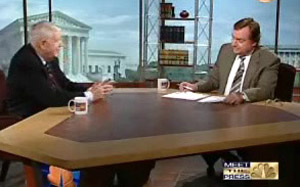
REP. MURTHA: I expect a significant troop withdrawal. They’re trying to find a way to do this. The trouble is it keeps getting worse and they don’t want to admit they made a mistake. You just have—at some point you got to reassess it like Reagan did in, in Beirut, like, like Clinton did in Somalia, you just have to say, “OK, it’s time to change direction.”
MR. RUSSERT: Karl Rove invoked your name in New Hampshire. Let me show you that comment.
(Videotape, June 12, 2006):
MR. ROVE: I want you to think about the consequences of their proposed course of action. If Murtha had his way, American troops would’ve been gone by the end of April and we wouldn’t have gotten Zarqawi.
(End videotape)
REP. MURTHA: They—Let me tell you, they built Zarqawi up. They have 1,000 foreign fighters. This is a civil war, and we did it from the outside, anyway. The good thing about what—when we got Zarqawi, it was Iraqi intelligence that came to the Iraqis that came to the United States. And then from outside the country, from the periphery of the country they went and bombed where Zarqawi was. So there, there was progress from that standpoint. But to say that it wouldn’t have happened is absolutely a political statement.
MR. RUSSERT: You did say, however, in ‘05, “Our military has done everything that has been asked of them. The U.S. cannot accomplish anything further in Iraq militarily.” The fact is the capture of—or the killing of Zarqawi was a military accomplishment. So the military could do more.
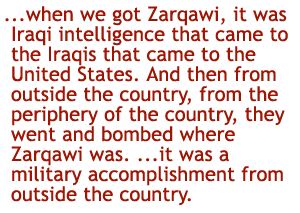
REP. MURTHA: Well, it was a military accomplishment from outside the country. We, we bombed, we bombed it. The, the information came from the Iraqis to the Iraqis to the U.S., and then we bombed where he was. And it—so it came from the outside.
...here’s the problem we have in, in this kind of a war. First, first of all you’ve got our troops in the green zone. President says, “OK, I’m going in. And it was nice to see a democratic country—a democratic organization in operation.” It’s in the green zone. It’s a fortress. They’re not out in, in the public. They’re—they cannot go outside the—when I first went to Iraq, you could drive any place. As a matter of fact, when I found the 44,000 body armor shortages I was out in the division in the field. When I went to Anbar—but now you can’t go outside the green zone. So, so—the, the government’s inside the green zone. So they’re, they’re where Saddam Hussein was.
Then, then let’s take the prison situation. We, we pass in the House and the Senate a veto-proof legislation that they shouldn’t veto and then the president says, “Well, we’re going to continue the same policy.” Now what does that say? We’re fighting a war of ideals and ideas. It’s no longer a military war. We have won the military war against their, their enemy. We toppled Saddam Hussein. The military’s done everything that they can do. And so it’s time for us to redeploy. And Iraqi—only Iraqis can settle this.
MR. RUSSERT: You say redeploy. Again, Mr. Rove challenges that comment.
Let’s listen and give you again a chance to respond to the White House.
(Videotape, Monday):
MR. ROVE: Congressman Murtha said, “Let’s redeploy them immediately to another country in the Middle East. Let’s get out of Iraq and go to another country.” My question is, what country would take us? What country would say after the United States cut and run from Iraq, what country in the Middle East would say, “Yeah. Paint a big target on our back and then you’ll cut and run on us.” What country would say that? What country would accept our troops?
(End videotape)
MR. RUSSERT: What’s your response?
REP. MURTHA: There’s many countries understand the importance of stability in the Middle East. This is an international problem. We, we use 20 million barrels of oil a day. China’s the second largest user. All these countries understand you need stability for the energy supply that’s available in the Middle East. So there’s many, many countries.
MR. RUSSERT: Who?
REP. MURTHA: Kuwait’s one that will take us. Qatar, we already have bases in Qatar. So Bahrain. All those countries are willing to take the United States. Now, Saudi Arabia won’t because they wanted us out of there in the first place. So—and we don’t have to be right there. We can go to Okinawa. We, we don’t have—we can redeploy there almost instantly. So that’s not—that’s, that’s a fallacy. That, that’s just a statement to rial up people to support a failed policy wrapped in illusion.
MR. RUSSERT: But it’d be tough to have a timely response from Okinawa.
REP. MURTHA: Well, it—you know, they—when I say Okinawa, I, I’m saying troops in Okinawa. When I say a timely response, you know, our fighters can fly from Okinawa very quickly. And—and—when they don’t know we’re coming. There’s no question about it. And, and where those airplanes won’t—came from I can’t tell you, but, but I’ll tell you one thing, it doesn’t take very long for them to get in with cruise missiles or with, with fighter aircraft or, or attack aircraft, it doesn’t take any time at all. So we, we have done—this one particular operation [in bombing Zarqawi], to say that that couldn’t have [been] done...it was done from the outside, for heaven’s sakes.
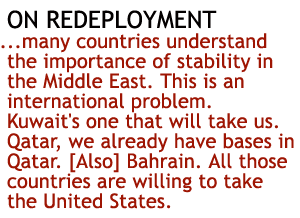
MR. RUSSERT: Big debate on the House floor this week, and then Congress, the House, voted for a resolution supporting the president. Forty-two Democrats crossed over and voted for the president. Joe Klein in today’s Time magazine writes this, “How is it possible - with 2,500 U.S. soldiers dead, no discernible progress on the ground and a solid majority of the public now agreeing that the war in Iraq was a mistake - for the Democrats to seem so bollixed about the war and for the president to seem so confident? A good part of it is flawed strategy. Democrats keep hoping that the elections can be framed as a referendum on the Bush policy, and Republicans keep reminding the public that elections are a choice, not a referendum.” Do you agree with that?
REP. MURTHA: ...I think we have to have a policy. That’s why I’ve been so adamant about this particular issue. And you see 150 people voted against this resolution. A year ago, it would have been a lot less that that. Six months ago, it would have been a lot less than that. So, so Democrats are starting to come around, and some Republicans. Twelve Republicans came to me after, after this vote and said to me, “Well, you know, I couldn’t vote for it, but I understand what you’re saying.” One very conservative Republican said, “We can’t afford to carry on this war. It’s killing us financially.” And, of course, I say not only financially but the troops are bearing this heavy burden.
MR. RUSSERT: But if the Republicans are capable of showing a contrast between the parties—in 2002, successfully; in 2004, successfully; the Republicans perceived, they hope, as the stronger party on national security—will that work in 2006? The Democrats will be portrayed as cut-and-run and the Republicans as the party of strength?
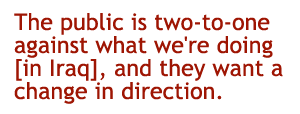
REP. MURTHA: Well, I think the public would have to be portrayed as cut-and-run if you talk about the Democrats being portrayed [as cut-and-run]—every place I go, people understand what I’m saying. The public has been away ahead. For instance, when I came to Congress in ‘74, I remember distinctly the public—they said we, we’d only win a few seats, we had a two-to-one majority at that time. We won all five of the special elections that year, we lost—we—when Vice President Ford’s seat—only had it for two years, but we won that seat. Then in, in ‘94, when the public turned against the Congress, we thought we’d lose 18, we lost 52 seats.
So, you know, it, it’s easy to them to try to spin the fact that it’s not going to happen. And I think we do have to have legitimate proposals. I think we have to talk about a lot of things besides the war itself, but the war has such a ramification, such—the debt itself is $8.4 trillion dollars. How we going to pay for this? Obviously, we’re going to have to adjust taxes from the higher level, there’s no question about it if you’re going to—unless you want your children and grandchildren paying for this. So we—a lot of problems we have to face. It’s an individual thing. Some areas it’s not as popular as others, but in the long run, a lot of people have changed their mind. It’s changed dramatically from the way it was today, and I think most—well, two thirds of the Democrats agree with my position now.
MR. RUSSERT: Do you think there’s a possibility—or do you ever have pause and say to yourself, “You know, maybe this might work a few years from now and we may have a democratic state in Iraq”?
REP. MURTHA: I, I would hope that, but I don’t see it happening. I measure it this way—when, when they say to me that progress has been made, I say give me the facts. Incidents have increased, doubled in, in the last six months. Oil production below pre-war level, electricity below pre-war level. Every single measurement that I use is either below pre-war level or is going backward. IEDs have gone up substantially. The number of insurgents have increased.
Now, got to keep in mind, we’ve got 130,000 troops in Iraq and, and yet these things have happened. Now, why have they happened with our troops there? Because we’ve become the enemy. We have to change our policy, we have to change direction. We all want the same thing, we want something to happen, we want a democratic government, but that’s not happening the way we’re doing, so we got to do it differently. Internationally, diplomacy is the key and we got to restore confidence. Our credibility is in the tank, as you well know. The whole world looks at us like, like we’re, we’re the bad guys. And some of the thing—it’s ideas and ideals, and unfortunately, we’ve lowered our standards with some of the statements this administration makes below the standards the United States usually has.
MR. RUSSERT: Are you concerned if we got out you could leave behind complete chaos, which could become a real haven for international terrorists, another Afghanistan pre-September 11?
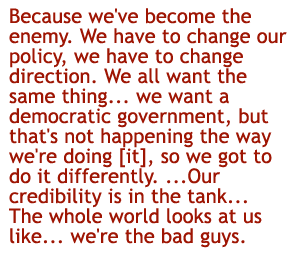
REP. MURTHA: I think—I think it’s the opposite. I—I think right now, we—we’re inciting, we’re recruiting, we’re recruiting terrorists in Iraq. We’re allowing them to train in Iraq. We’re allowing—when we do things like—we, we go into Fallujah, which, which they considered a military victory. We put 300,000 people outside their home.
Now, why? Why do we do it? Because we use overwhelming force in, in order to comply with the military structures that we have. I agree with that. We have to do that to protect Americans. But that makes enemies. And when you use military force to make enemies, you inadvertently pay people. And to give you an example, we—last year, we spent $5 million dollars; the year before last, $5 million dollars in consultation—or consolation payments. Last year it was $20 million dollars. That means we killed that many more people. Every time you kill an Iraqi, even though it’s inadvertent, you make an enemy, and the way the military has to operate.
Bush said, when he first ran for office, “We’re not going to do nation-building.” That’s what we’re in to, and we’re not successful at it. The military is not successful at nation-buildings, particularly in an insurgence. Now, let me make it clear: 1,000 insurgents, that’s all. There were only 200 there three years ago. Two hundred. And now, they think, in the insurgency itself, it could—foreign fighters, foreign fighters, 1,000, maybe 15,000 insurgents. We’re there, and there’s 15,000 insurgents. Went from 200 to 15,000. That’s the problem. We’re not, we’re not, we’re not making progress. That’s the problem.
MR. RUSSERT: John Kerry, the Democratic nominee in 2004, who voted for the war, gave a speech this week and he said this: “Let me say it plainly: It’s not enough to argue with the logistics or to argue about the details or the manner of the conflict’s execution or the failures of competence, as great as they are.
“It is essential to acknowledge that the war itself was a mistake ... to say the simple words that contain more truth than pride.
“We were misled. We were given evidence that was not true. It was wrong, and I was wrong to vote for that Iraqi war resolution.”
Do you believe any Democrat who seeks the nomination for president in 2008, who voted for the war in Iraq, should publicly say not just the war’s been mismanaged, “I was wrong to vote for the war.”
REP. MURTHA: Yeah, it’s obvious. It was a mistake. And I’ve said this from the very start. I mean, you had no weapons of mass destruction, you had no connection with al-Qaeda, there was no danger to our national security. We don’t put young people in harm’s way unless we have a threat to our national security.
I’m in a hospital, young woman’s standing there beside her wound—badly wounded husband, and she says he’s been in Iraq twice, and he enlisted to fight for America, not for Iraq. We want stability; it’s an international problem. But, but we, we, we can’t achieve it in the direction they’re going. These, these comments they make about cutting and running, so forth and so on, that doesn’t, that doesn’t solve the problem. What is their plan? They have no plan. And we’re, we’re recruiting terrorists against us, Tim. That’s the problem.
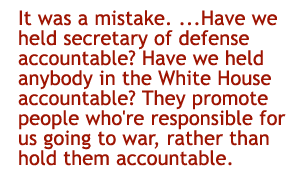
MR. RUSSERT: They say their plan is, when the Iraqis stand up, we stand down. That, if given time, the Iraqis will produce enough of a military and security force to secure their country, put down the insurrection, and allow the Americans to go home.
REP. MURTHA: I, I believe when we redeploy, that will happen. I believe there’s only 1,000 foreign fighters, 1,000 in al-Qaeda. Might be more foreign fighters, but 1,000 al-Qaeda in Iraq. I believe they will get rid of them. Just like Zarqawi. It didn’t come from us; it came from the Iraqis. The Iraqis know who these people are, and they’ll get rid of them. I think there’ll be less chaos than there is when, when we’re there. Because we’re the ones that are forcing—they’re recruiting people. They’re—when a person’s willing to kill themselves, why? Because we’re there. Eighty percent of the people want us out. The president, vice president of Iraq said, “Give us a timetable to get out.” They know how important it is.
Internationally, who have we held responsible for this thing and accountable? Have we held secretary of defense accountable? Have we held anybody in the White House accountable? They promote people who’re responsible for us going to war, rather than hold them accountable. That’s the first stage. And the second stage: Admit you made a mistake. President’s admitted he made a few mistakes. It’s more than that. We went to war on the wrong assumptions. We made a terrible mistake, and we need to talk to the international community, get their help, just like in the first Gulf War, where they paid $60 billion dollars, they had 160,000 troops involved in that, and we went to the border. Bush One said, “I’m not going to Iraq because I don’t want to occupy it, I don’t, I don’t want to rehabilitate it. It would cost too much money and too many lives.” And he was right. And a lot of right-wingers said, “Oh, no, we should’ve gone in.” Well, they found out what it’s like to go in now.Whew! Hurrah to Murtha for having a plan and telling the truth! If we keep the Bush Rubber Stamp Republicans in charge, forget about it. No plan for Iraq. Just the same old tired non-plan of "stay the course." Pathetic. Add in the report from the U.S. embassy in Iraq that "painted a starkly different portrait of increasing danger and hardship" than Bush's "upbeat assessment," and anyone with half a brain can discern that the WH still disseminates faulty information about Iraq now as they did before the invasion. In short, Bush and his Rubber Stamp Republicans are covering up the disastrous mistake in national security--their claim to fame--and soon, miraculously just before the midterm elections, wanna bet that Bush will begin withdrawing troops? Wanna bet Bush co-opts Democratic Congressman Murtha's plan?
I could make lots of comment on Murtha's position but he articulated a plan for redeployment and why staying the course is a failed policy brilliantly all by himself. What more could I add other than he's right. And Murtha has an actionable plan for Iraq. Today.











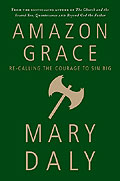











|